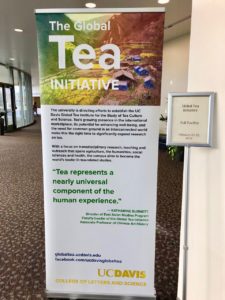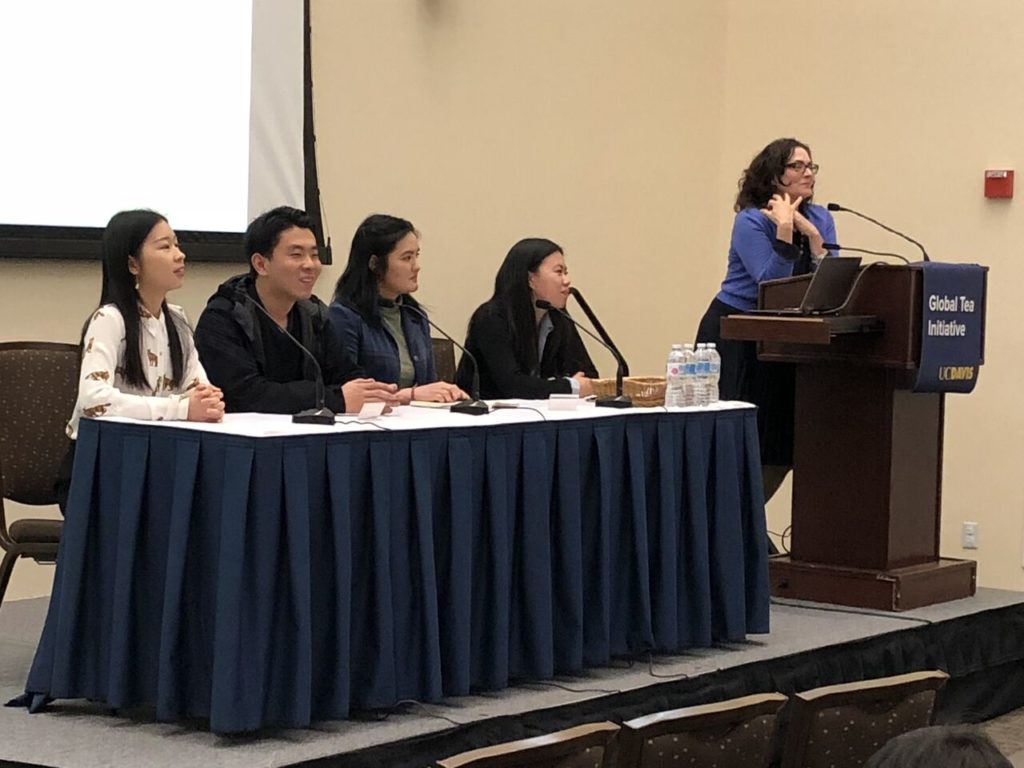DAVIS, Calif. The University of California at Davis has begun transforming its three-year-old tea initiative into  the more formal Global Tea Institute to promote the science and culture of tea. The institute eventually will offer graduate and undergraduate degree programs like the university’s School of Viticulture & Enology, well known worldwide for its impact on wine. “Tea represents a nearly universal component of the human experience,” said UC Davis Professor Katharine Burnett, the Global Tea Initiative’s (GTI) founding director. She welcomed attendees to GTI’s third symposium last week with the announcement the university intends to “become the world’s leader in tea-related studies in all its dimensions and from a global perspective.” GTI respects the fine work already being done at research institutes with important tea programs around the world, she said. "We’re into the third year of a 10-year timeline. With the help of tea industry sponsors and the larger community, we anticipate becoming an Institute much, much sooner,” she said. The Global Tea Institute for the Study of Tea Culture and Science is imagined to be headed by a director with a small staff and serve “as an umbrella program, binding together the professors and librarians who remain in their home departments. It is envisioned that the institute would draw endowed chairs in at least four different disciplines (e.g., health sciences, agriculture and environmental studies, humanities and social sciences, etc.), to underscore the diversity of the approaches engaged in our vision and make these diverse approaches permanent fixtures of the institute,” according to Burnett.
the more formal Global Tea Institute to promote the science and culture of tea. The institute eventually will offer graduate and undergraduate degree programs like the university’s School of Viticulture & Enology, well known worldwide for its impact on wine. “Tea represents a nearly universal component of the human experience,” said UC Davis Professor Katharine Burnett, the Global Tea Initiative’s (GTI) founding director. She welcomed attendees to GTI’s third symposium last week with the announcement the university intends to “become the world’s leader in tea-related studies in all its dimensions and from a global perspective.” GTI respects the fine work already being done at research institutes with important tea programs around the world, she said. "We’re into the third year of a 10-year timeline. With the help of tea industry sponsors and the larger community, we anticipate becoming an Institute much, much sooner,” she said. The Global Tea Institute for the Study of Tea Culture and Science is imagined to be headed by a director with a small staff and serve “as an umbrella program, binding together the professors and librarians who remain in their home departments. It is envisioned that the institute would draw endowed chairs in at least four different disciplines (e.g., health sciences, agriculture and environmental studies, humanities and social sciences, etc.), to underscore the diversity of the approaches engaged in our vision and make these diverse approaches permanent fixtures of the institute,” according to Burnett.

The two-day symposium drew a crowd of 540 to hear lectures and presentations. Here is a recap: Farming Tea in California Opening the afternoon session was an inspirational address by M.J. Greenberg, a world-renowned percussionist who is pioneering tea planting in California’s gold country and gaining new renown as a leading transmitter of the spirit of tea. Greenberg described a new sustainable model for boutique commercial agriculture near Nevada City, Calif. Jade Valley Tea Arts combines elements of permaculture, community organization, biodynamic practices, and plant communication in the production of handmade tea. The university’s Kearney Station already harbors 50-year-old plants, and tea plants are also thriving on small coastal and mountain farms. The first hurdle to expansion is acquiring tea seedlings in sufficient quantities, according to experts Mark Gaskell, UC Small Farms Advisor, Jeffrey Dahlberg, Director of UC’s Agriculture Station at Kearney, CA, and UC Davis Professor of Chemistry Jacquelyn Gervay Hogue. Their collective message was: “Yes we can”(grow California tea as a small farm crop). Tea in the Future In his keynote address, Nigel Melican, the veteran tea research scientist who has worked and consulted in 30 different countries during his 38-year career, was far from comforting. “Tea is facing a bumpy ride,” said Melican. “The tea industry is set to change more during the next 20 years than it has in the last 200, and arguably in the last 2,000,” he said. Pressure from population growth and climate change, not to mention China’s burgeoning middle class and other factors, will inexorably produce a bifurcated tea industry, the greater part increasingly industrialized production of commodity tea of indifferent quality at best, and a much smaller industry continuing to produce specialty teas but at greatly increased prices, he explained. As Kenya, the world’s third largest exporter of tea, gradually succumbs to climate warming, tea production is migrating to central Africa. As Assam, the world’s largest tea growing region, turns into a waterlogged swamp unsuitable for tea growing, India will inevitably lose the bulk of its tea production. Because of problems like these, fine tea is destined to become an expensive luxury product by 2050. The Melican presentation, like all the others, will be made available on the GTI website. Precision Plantations Three distinguished scientists were the first to speak on Friday, Feb. 23, which included Professor Yuan Shen of Taiwan and Professor Wenyan Han of China’s Tea Institute. Yuan Shen, a specialist in soil and environmental sciences, addressed “precision tea plantation management” while Wenyan Han spoke about the impact of climate change on China’s tea production. The focus of both talks was on adaptation strategies to mitigate the effects of global warming on tea growing. It’s Not Antioxidants UC Davis Research Scientist Robert Hackman’s presentation topic was “Why Are Tea Drinkers So Healthy?” To everybody’s surprise, we were told it is not because of tea’s antioxidants. To understand this point and learn the real reasons we are so healthy one must download the very entertaining video of Dr. Hackman’s speech. After lunch four UC Davis students presented brief synopses of their own research projects, to widespread admiration and applause. An especially inspiring concept is the Global Tea Club they have founded for university students worldwide. Women Entrepreneurs in Darjeeling Anthropologist Debarati Sen of Kennesaw State University, Georgia, led off the afternoon session with a first-hand account of the “Fempreneurs” of Darjeeling—women attempting to earn a livelihood and unaided by well-intentioned efforts like Fair Trade and other Western NGO-administered ideas, which she described as irrelevant to workers’ incomes and daily life. Around the World Kyoto-based Paul Berry, Ph.D., Japanese Government Kaken Research Fellow, Kyoto, Japan and Mellon Curator-at-Large, Indianapolis Museum of Art, Indianapolis, Indiana, described the continuing economic and cultural collapse of chanoyu and its impact on Japan’s tea culture. And Professor Burnett gave the audience an intriguing look at her research as an art historian into reconstructing Vietnam’s early tea culture through teapots. The concluding talks were devoted to sustainability at various tea farms. The only tea grower to speak at the Symposium, Kunikazu Mochitani, described his innovative practices as a matcha farmer in Shizuoka, Japan. Elyse Petersen, MBA, founder and CEO of Tealet, delivered a challenging “Transparent Look into Direct Trade and Sustainability in the Global Tea Industry” address, and China’s Zhao Zhong, director of Green Camel Bell environmental NGO, ended the symposium with his talk on small tea farmers. The initiative was funded for three years. Burnett said that "sponsorships coming in from the tea industry, philanthropists and the larger community, for which we are extremely grateful, will enable us to continue to host colloquia, symposia and lecture series. Additionally, we are starting to plan extracurricular courses and workshops for the tea community professionals and tea community at large." The symposium was well organized, smoothly presented and generally enjoyed by an audience consisting mainly of leading U.S. tea professionals. All attendees seemed to be united in the conviction that tea has at last found its long-awaited ally in America’s academic community. Tea industry sponsors included Harney & Sons, Ito-En, Mighty Leaf, QTrade Teas & Herbs, Rishi Tea, Sierra Tea, SA (Sugimoto America), and Waterfall Tea (ITI). Source: UC Davis
